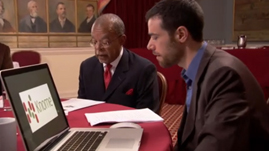Teachers' Domain - Digital Media for the Classroom and Professional Development
User: Preview

Source: Faces of America: "Frenetic Genetics"


Faces of America on VITAL is made possible by The Cola Company.
Funding for Faces of America on PBS was provided by The Coca-Cola Company and Johnson & Johnson. Additional funding was provided by the W.K. Kellogg Foundation, Carnegie Corporation of New York, The Atlantic Philanthropies, and The John D. and Catherine T. MacArthur Foundation. Additional support is provided by the Corporation for Public Broadcasting and PBS.
Frenetics Genetics Transcript (Document)
Nathaniel Pearson: We did find in your genome you have an interesting variant that’s associated with glucose galactose absorption.
Gates: I am severely lactose intolerant.
Hugh Young Reinhoff, Jr., MD: You had variants in genes that are know to be, to play a role in epiphyseal development.
Gates: My slipped epiphysis.
Pearson: Exactly.
Gates: My broken hip when I was fourteen.
Pearson: Just looking at your list of variants we would have predicted that you wouldn’t be going bald very fast.
Gates: What’s it look like up there. I mean, it’s like skin back there (points to head).
Scientists: I see hair. Yeah I see hair.
Narration: I was astonished at how much these guys knew about me. The texture of my hair and how much of it i could expect to keep, my fractured right hip, my tortured relationship with milk and ice cream – and thousands of other physical traits —they could see it all by analyzing my DNA. But what about my propensity for diseases?
Joseph Thakuria, MD: You do have a sickle cell trait which has no consequence whatsoever if you don’t have the mutations. We didn’t find any mutations in genes that cause early onset Alzheimer’s.
Gates: Thank you Jesus (laughs). So what you said was, I’m OK?
Thakuria: You're OK.
Gates: Good.
Narration: I also learned that I’m fairly resistant to malaria and am highly tolerant of caffeine – both traits I got from my father.
 Loading Standards
Loading Standards